- Home
- Joseph Bruchac
Brothers of the Buffalo Page 27
Brothers of the Buffalo Read online
Page 27
“Perhaps,” Gray Head said, “if we do not hurt any ve’hoes, they will see that we are just trying to survive. Then they will not be angry with us. Then maybe there can still be peace.”
The summer moons passed. Though life was not easy, their small band remained free. However, with the coming of the Cool Moon, terrible word came about Medicine Water’s band. Although those with Gray Head had done the best they could, Medicine Water had done the worst.
The story was pitiful. It was difficult to tell. Medicine Water and Mochi and the twenty with them had come across a wagon driven by a white man. He had with him his wife and their seven children. The only weapons those innocent white people had were two muzzle-loaders. Those guns were so bad that Medicine Water’s band just left those old rifles on the prairie. What Medicine Water’s band did take were the lives of five of those people. They killed the man. They killed his wife. They killed three of the children. Then Medicine Water’s band took the remaining four girls as captives.
Many terrible things had been done by the ve’hoes, more than could be counted. But it did not make it right to do the same. Medicine Water and his band had not behaved like real human beings. When Mochi split the head of that poor ve’hoe father with an ax, her heart had been as bad as that of the worst white man.
Five days had passed since they had heard of what Medicine Water and Mochi did. Gray Head had led them to a sheltered valley, a good place for their camp. There were trees for firewood and a spring of sweet water. And Wolf had seen a small herd of antelope out on the rolling plain. He knew that no game animal was more curious than the antelope. So that morning he had tied a white cloth to a stick and placed it where it would wave in the wind. Then he had hidden in a small dip in the land and concealed himself with brush. His plan had worked well. The antelope were drawn by the white cloth. From his hiding place Wolf was able to bring down two fat antelope with his arrows.
Now the smell of cooking meat was drifting through their camp. That night they would eat well.
I wish that we could stay here for a long time, Wolf thought. But if we do so, there is a greater chance that the army’s Tonkawa scouts will find us. We must move.
Gray Head had said that they would be safe here for two more days. Then they would move camp. Or maybe they would have to do so sooner.
Wolf saw hand signals being made by the sentry who had been placed among the distant boulders near the valley’s entrance. It was Too Tall. He was out of sight from anyone coming across the plain, even though he was visible to those in the camp.
People coming, Too Tall signaled.
Enemies? Wolf signed back to him.
No. Real People.
Others had seen Too Tall’s signal, so everyone in the camp was watching as the riders entered the valley. It was as Too Tall had said. They were Real People. Striped Arrow People. Cheyennes. But it was not good that they had come. The two who rode in front were Medicine Water and Mochi. A dozen men, ten women, and four girls followed them. All had the worn and tired look of people who had traveled far without food or rest. But as they got closer, Wolf saw that the four girls were not just tired from travel. Their faces were frightened. Their expressions were those of ones who had just seen a bad ghost. Their horses were being led by Medicine Water’s men. The travel dust had darkened the girls’ faces. They were the four sisters who had survived the killing of their family members.
Medicine Water slid off his pony and walked up to Gray Head. He held out his hands. Gray Head said nothing, made no move to welcome him.
“My friend, are you not going to invite us to eat?” Medicine Water said. “We have had no real food such as we smell cooking here. All we have had to eat is what we have taken from ve’hoes.”
White people he killed, Wolf thought.
There were many of them now. Medicine Water had vowed to take ten lives for every Cheyenne who fell to the buffalo hunters’ guns. He was well on his way to fulfilling that promise. Some were buffalo hunters. Medicine Water’s warriors caught them as they were leaving Adobe Walls. Despite the fact they had held off Quanah’s attacks, that place had now been abandoned. But most of those he and his band had killed were as innocent as the four captive white girls.
Gray Head sighed. Trouble had come to him. But he still had to show proper hospitality. “Come,” he said. “Eat.”
As they moved toward the cooking fire, Wolf looked into the eyes of the captive girls. Two of them were not little girls. They were young women.
“You see this one,” one of Medicine Water’s men said. His name was Rising Bull. He squeezed the arm of the taller of the two young women. “I think I will make her my wife.”
Wolf said nothing. It was true that captive women often ended up being married to Cheyenne men. But they were adopted when that happened. They were treated with as much honor and respect as any woman born Cheyenne. He could see that those two young woman had not been treated that way.
The one who seemed to be the oldest seemed to notice that Wolf was looking at her in a kindly manner. She tried to smile at him. Mochi walked over, and the smile vanished from the white girl’s face.
“This one is Gah-dlin,” Mochi said. She slapped the girl hard on the back of her head. “She tries to help. She is stupid. But maybe she will make a good wife.” Mochi slapped her again. “Or maybe not. Maybe I just kill her like I did her father, hah?”
Wolf could see that someone—probably not Mochi—had braided the hair of the four captives. They had been put into proper clothing to look like women of the Striped Arrow People. But there were many bruises on their faces and arms.
Mochi named the others, pointing at them as if they were dogs.
“Tso-fia, Choo-lee, Ah-dleyt.”
They cringed back as she swung her hand toward each of them.
Wolf felt such pity for those girls. When Mochi walked away, he cut off a piece of liver. He handed it to the oldest girl, the one Mochi called Gah-dlin.
“Thank you,” she said.
But when she tried to feed it to her littlest sister, Mochi came back around the fire. She pushed Gah-dlin down, snatched the piece of liver away from the littlest girl, and ate it herself.
“Foolish girl. Why waste food on one who is too small to do any work?”
No one did anything to stop Mochi. The captives belonged to her and her husband. But Wolf could see from the look on Gray Head’s face that he, too, was pitying those pathetic girls.
“Uncle,” Wolf whispered to him. “I have an idea. Let us trade for these captive girls. If we have them with us, the army may not attack us. Then if we give them back to the their own people, maybe the ve’hoes will treat us better.”
Gray Head looked at the four girls. The two little ones were almost dead from hunger. They were like puppies that had been beaten so much they no longer dared to raise their heads. They would not survive much longer being treated this way. Gray Head nodded. He turned to Medicine Water.
“What will you take for these four ve’hoe girls?” Gray Head asked.
At first Medicine Water refused to trade at all.
“Those two bigger ones useful,” he said. “They are strong enough to help around the camp.” He pointed with his chin at Gah-dlin. “That taller one is skinny, but she can carry more firewood than you would imagine. Rising Bull has been thinking that he might take her as his wife.”
“What about the little ones?” Gray Head said.
Finally a deal was struck. When Medicine Water and his people rode away, they took only two captives with them. The two little ones, Choo-lee and Ah-dleyt German, stayed. In exchange, Medicine Water had accepted four blankets, a parfleche bag of dried meat, one horse, and two knives.
Still, even though she remained a captive, there was something close to a smile on the face of Gah-dlin as she was taken from Gray Head’s camp. The look that she gave Wolf and Gray Head was one of gratitude. She knew they had saved the lives of her little sisters.
After bringing the buffal
o, Sweet Medicine went to do another thing for the People. He and his wife tied their travois to a dog and went toward the black hill till they came to a great butte. Inside that hill was a big lodge.
The People opened the door for Sweet Medicine.
“Grandson,” they said, “you have come back again. Come and sit in our lodge.”
Sweet Medicine and his wife entered.
They sat just inside the door. Sweet Medicine looked around at those gathered within the big lodge.
Those inside that lodge were all of the beings that grow and exist upon the earth. They were Mai-yun, Spirit People. They were the animals and birds, the trees and the grasses and the rocks. All of them seemed to be people as Sweet Medicine entered. Four of those people, though, stood out above all the others. To the right of the door sat a man who was all black. At the back of the lodge to the right was a man who was brown. Beside him, to his left, was
another man who was all brown. To the left of the door was a man who was all white. Those four men were
handsomer than anyone Sweet Medicine had ever seen
before. He looked at all of them for a long time.
“Now,” said the Chief Mai-yun, “we have brought you here to give you spiritual power to take back to the People. But first you must choose one of these four men you would most like to resemble.”
As he spoke, the Chief Spirit Person pointed with his lips,
indicating the men to each side of the door.
But Sweet Medicine paid no attention to that.
“I have chosen,” he said. “I will be like that brown man
there at the back of the lodge.”
As soon as he spoke those words, everyone inside
the lodge groaned. One of the Spirit People stood up. “That man is a fool,” he said, and then he left the lodge.
“Grandson,” the Chief Spirit Person said, “you have made a mistake. Look.” As Sweet Medicine looked,
the white person and the black person became stones.
“If you had chosen them,” the Chief Spirit Person said,
“you would have lived forever. But now, though you will live a long time, you will die. And the one who is now
entering this lodge will always be around.”
As those words were spoken, a thin man came into
the lodge, sat down, and began to cough.
“That man is Sickness,” the Chief Spirit said.
“Now he will always be around your people. He belongs
to Winter Man and will come each year to your lodges.”
“Is there nothing I can do to help the People?”
Sweet Medicine asked.
Buffalo Bull spoke. “Fire will help the People.
It will guard against the cold brought by Winter Man.
“I can bring fire with my lightning,” said Thunder.
“But the People will need to know how to make fire
for themselves.”
Buffalo Bull gave Sweet Medicine a dry buffalo chip and a stick. “With these you can make fire.”
Then Thunder showed Sweet Medicine how to make fire by resting the point of that stick on the buffalo chip and twirling the stick between his hands.
One by one the other spirit beings taught Sweet Medicine other things to help the People. Last of all, the Chief Spirit spoke. “Now your wife must turn away and close her eyes”
Then he showed Sweet Medicine eight arrows.
Four were fletched with hawk feathers.
Four were fletched with eagle feathers.
“Which four arrows do you choose?” the Chief Spirit asked.
Sweet Medicine looked close. He took his time to make his choice. “These four,” he said, choosing the four eagle feather arrows.
The Chief Mai-yun smiled. “This time you chose well.
These arrows are the Maahotse. They are the Medicine
Arrows. These two painted red are the buffalo arrows.
They will bring food and nourishment for the People.
These two painted black are the man arrows.
They will bring victory over your enemies.”
Then the Chief Mai-yun made a quiver from a coyote skin
and placed the arrows within it. He showed Sweet Medicine how to wrap the arrows in the hide of a buffalo. When those arrows were safely hidden from sight within the buffalo skin, the Chief Mai-yun turned to Sweet Medicine’s wife.
“Although no woman must look at these arrows or touch them, as the wife of the Arrow Keeper, she will be the one who carries them,” he said. Then he painted her with spiritual paint, wrapped a robe around her, placed the arrows on her back, and gave her a cane to lean upon.
So it was that Sweet Medicine and his wife brought
the Sacred Arrows to the People.
DEATH SONG
Fort Sill,
Indian Territory
September 22, 1874
Dear Mother,
I hope all is well. Things here have become quite hot. By this I mean not only the temperature, but also the situation with our Indians. Sadly, circumstances have led to what I know the eastern newspapers are calling a general uprising. I would not mention this if it were not for the fact that I know you have likely read some of the highly colored accounts in the newspapers. I know you may be fearing for my safety.
Please do not worry. Our Cheyennes have left the agency. But they are more eager to flee than to confront us. Our forces are far superior, and they are well aware of that fact. It is now our job to round them up and bring them in. Rather than heroism, what is called for on our part is to be rather like truant officers charged with bringing in delinquent students. Hardly a gun has been fired, and when weapons are discharged they are almost always our own. Please do not worry that I am in danger.
How are things at home? How of Mr. Mack? How of my sister who is certainly reading this to you? (Pegatha, I enjoy your asides in the letters you have written. They are quite amusing. However, I hope that your next letter will include just as much truth as humor. I hope you understand my meaning.)
I have become quite close with Bethany. I now dare to think and hope that after my time in the army we might have a life together. But I have not yet gone further than thinking and hoping. Still, she treats me with such kindness and affection that I believe our feelings to be mutual and that our minds truly meet as one.
I continue to enjoy the confidence of our Lieutenant Richard Henry Pratt. He has indicated he wishes me to remain at his side in all of our engagements. I am usually the company flag bearer, which is a considerable honor.
I send my love and warm wishes and await your next letter.
Your loving and obedient son,
Washington Vance
The past months had seen one long march after another, hard on the heels of the hostiles. The 10th had done little actual fighting with the Indians. But what they had accomplished had been as good as victories in battle. Whenever they came across an abandoned camp—tipis standing empty with smoke still rising from their cooking fires, a sure sign that the hostiles saw them coming and took to their heels—they had made use of a weapon more effective than any gun.
The match.
Every deserted lodge. Every camp. Clothing, food, shelter, blankets, every possession that had not been lugged away was sent up in flames. Now and again they did corral an actual Indian. Most often it was some old man or woman too weak or slow to manage to get away. They found them sitting on the prairie, their hands held up, singing.
This time it was an old man that they had caught.
Though I don’t rightly know if caught is the right word to describe a rabbit hopping into your pot, Wash thought.
The three of them riding point, Wash, Charley, and Josh, had almost trotted past him where he sat. He had been nigh invisible. What with his legs out in front of him, his brown skin and stick-thin arms and legs had blended in with the dirt and dry brush around him. When he had started to chant, it had been so sudden that Josh’
s horse had reared up.
“Jehosophat!” Josh yelled as he grabbed at the reins, barely staying in the saddle.
“Watchit,” Charley chuckled. “If that old fella was a snake he’d have bit you.” Josh had his rifle out and was pointing it at the old man. The old fellow paid him no mind, singing even louder.
He has been here some time, Wash thought. His lips are cracked from not having any water to drink. Voice is still strong, though.
“Lower your weapon, Josh,” Wash said. “We are in no danger here.”
“What in blazes is this old Cheyenne lizard chanting?” Josh asked as he craned his neck at the Indian.
“He is Kiowa,” a deep, familiar voice said from just behind them. It was Wash’s turn to jump. Johnson, the Tonkawa head scout, had come up so quietly they had not heard him.
“Kiowa he is, then,” Charley said, a big grin on his face. “And you just about jumped out of your skin, Wash!”
That strange sense of humor of Charley’s was a bit unsettling at times.
He is like the man in the old story my father told me, Wash thought. About a man who found it funny when his friends were in trouble. That man was out hunting when he heard a call for help. He climbed a hill and looked down into the valley below, where he saw a friend of his being chased around a big tree by a bear.
“Help me!” the man being chased by the bear yelled as he ran around and around that tree.
“You want to catch that bear,” the man with the sense of humor yelled down, “you need to run a mite faster.”
“What’s he chanting?” Josh asked.
Wash thought he knew the answer, and Johnson’s reply proved him right.
“Death song,” Johnson said. He leaned closer to look at the old man, then turned back to Wash.
“Remember him?”
Wash shook his head.
“Last time you see him, you feed him. Skinnier now.”
A lump formed in Wash’s throat. He did recognize the old Kiowa. That half-moon-shaped scar on his forehead. He was one of those who’d been fed that day at the fort. Only a handful of Kiowas, led by Lone Wolf and Mamanti, had taken part in the fight at Adobe Walls. And even after Adobe Walls, no more than another eighty or so of their people had been convinced to take the war path with them. Just about all the enrolled Kiowas had stayed at the agency. They had wanted no part of another war. This old man, though, maybe because he was one of Lone Wolf’s relatives, had joined up with the hostiles.

 Peacemaker
Peacemaker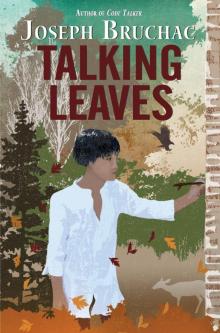 Talking Leaves
Talking Leaves Found
Found Killer of Enemies
Killer of Enemies Wabi
Wabi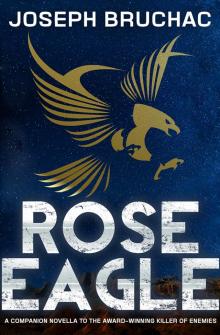 Rose Eagle
Rose Eagle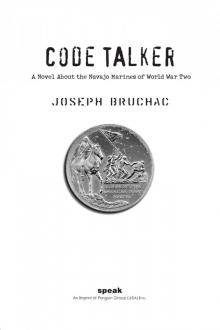 Code Talker
Code Talker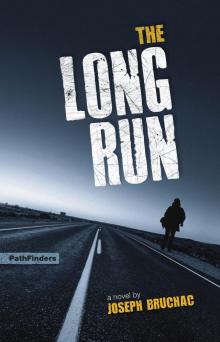 The Long Run
The Long Run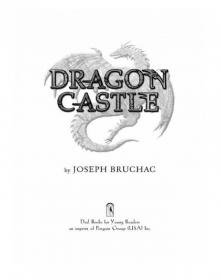 Dragon Castle
Dragon Castle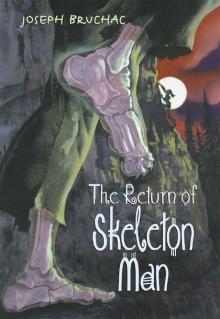 The Return of Skeleton Man
The Return of Skeleton Man Pocahontas
Pocahontas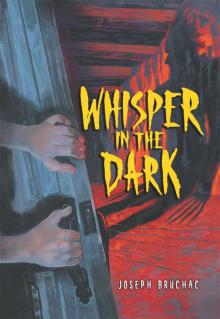 Whisper in the Dark
Whisper in the Dark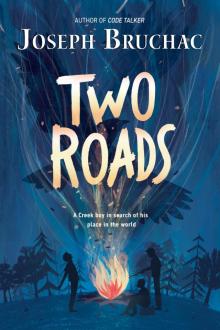 Two Roads
Two Roads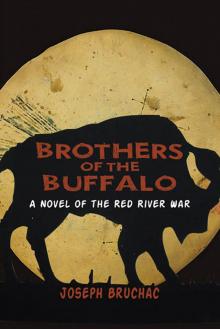 Brothers of the Buffalo
Brothers of the Buffalo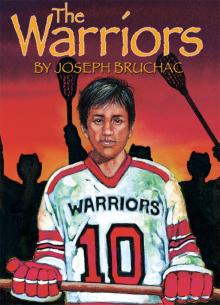 The Warriors
The Warriors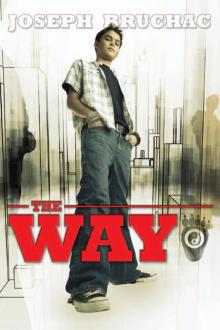 The Way
The Way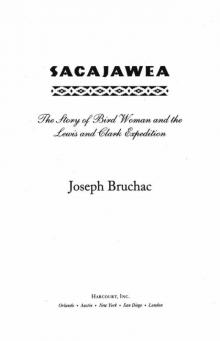 Sacajawea
Sacajawea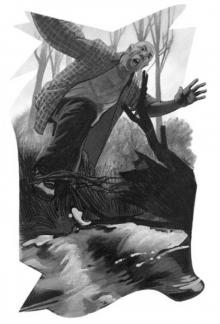 Night Wings
Night Wings March Toward the Thunder
March Toward the Thunder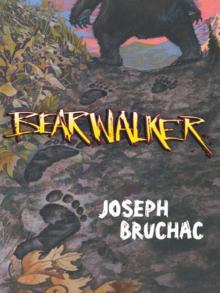 Bearwalker
Bearwalker Skeleton Man
Skeleton Man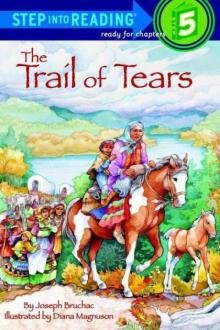 The Trail of Tears
The Trail of Tears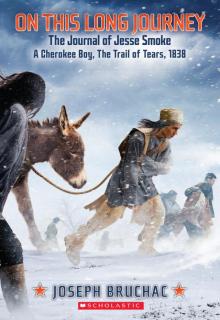 On This Long Journey
On This Long Journey Flying with the Eagle, Racing the Great Bear
Flying with the Eagle, Racing the Great Bear